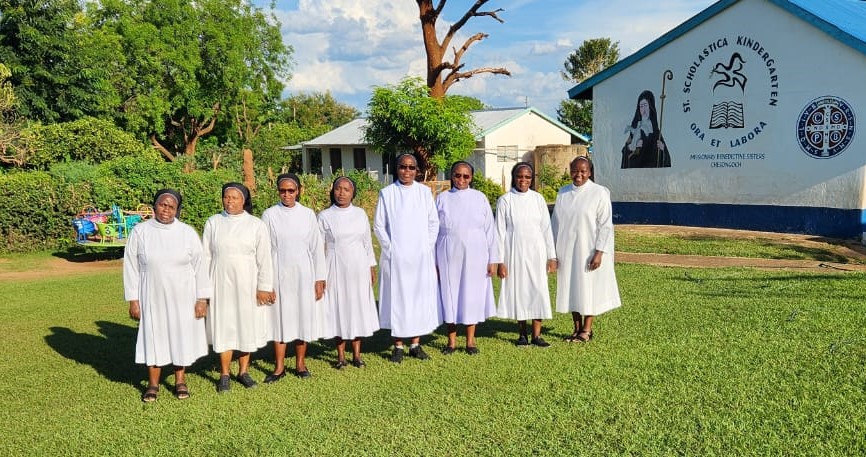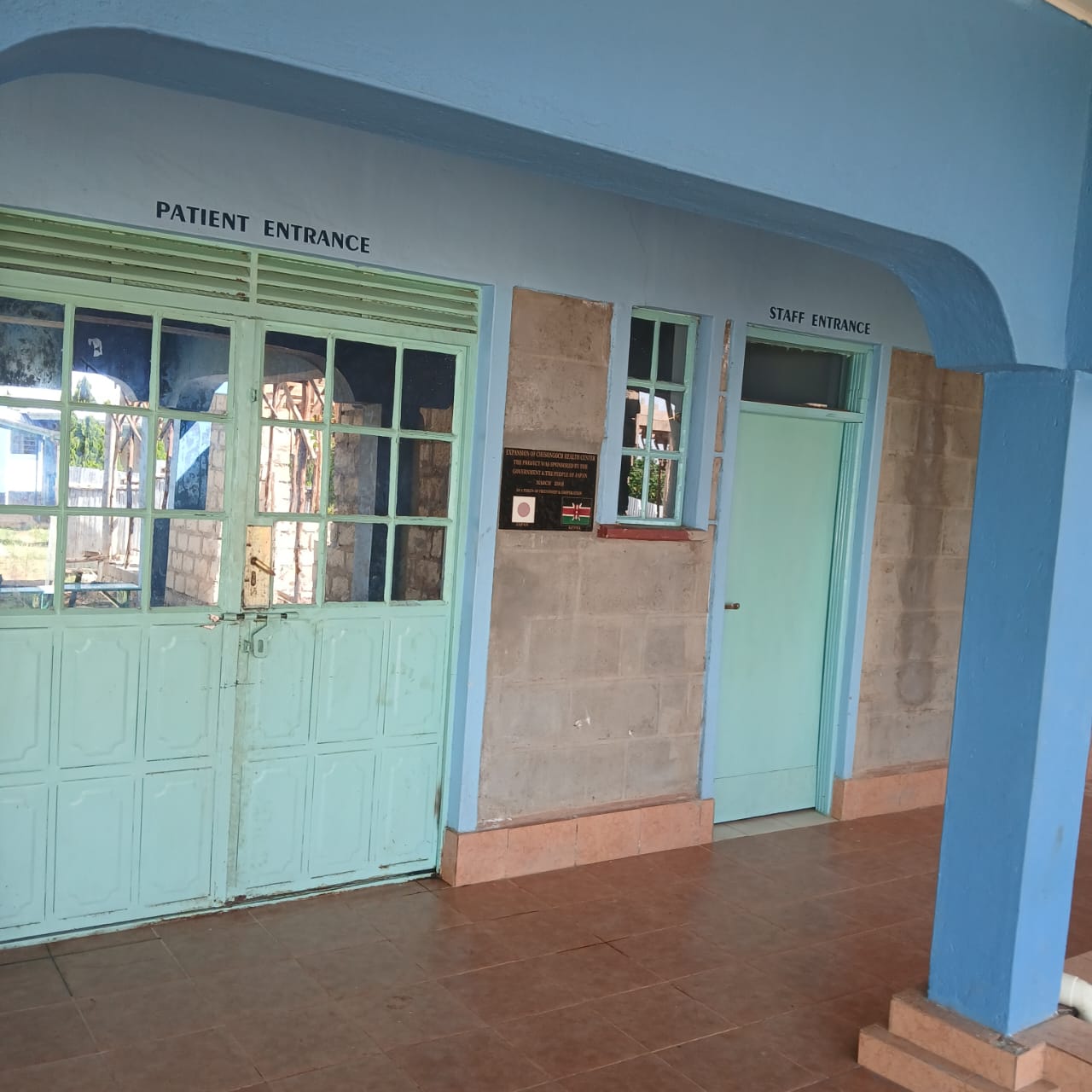
Members of the Missionary Benedictine Sisters of Tutzing stand outside their kindergarten in Kenya's Kerio Valley shortly before they closed their missions in the region. For more than 40 years, the sisters provided medical care, education, and spiritual support to local communities. (Courtesy of Missionary Benedictine Sisters of Tutzing)
A group of Catholic sisters has suspended its religious mission and closed the only major hospital in Kenya's troubled Kerio Valley after a priest was shot dead May 22. Their departure ends more than four decades of service in an area challenged by violence and poverty.
The Missionary Benedictine Sisters of Tutzing announced on May 30 that they were leaving the region due to growing insecurity. Their immediate closure includes Chesongoch Mission Hospital, the only fully functioning medical facility in the area, which had long served as a lifeline for the community.
"This has not been an easy decision," said Sr. Rosa Pascal, the group's leader in Kenya. "But due to the growing unrest, our community must prioritize the safety and well-being of our members."
The sisters' departure came days after Fr. Allois Cheruiyot Bett was killed May 22 by suspected bandits while returning from celebrating Mass in a nearby village, according to Agenzia Fides, a Vatican news agency that reports on church missions. Bett had just been assigned as the head of St. Matthias Mulumba Tot Parish in the Diocese of Eldoret. His murder shocked the religious community and the local population.
"We are devastated by the loss of Fr. Bett," Eldoret Bishop Dominic Kimengich said May 27. "He was a committed servant of Christ. His murder shows the growing danger that our priests and sisters face in this region."
Fr. John Maina Ndegwa, left, was a parish priest of St. Louis Parish in Igwamiti in the Diocese of Nyahururu. He was killed May 15, 2025. Fr. Allois Cheruiyot Bett of the Diocese of Eldoret, right, was killed on May 22. (OSV News/Courtesy of Dioceses of Eldoret and Nyahururu)
On May 15, another priest was found critically injured on the side of a highway hundreds of kilometers away. Fr. John Ndegwa Maina, 43, had been kidnapped near Nyahururu and left for dead, Agenzia Fides reported. A taxi driver found him, and he was taken to St. Joseph's Mission Hospital, where he later died.
It's unclear if the two attacks are connected, but they have raised fears about growing violence against church workers across Kenya.
"The murder of Fr. Bett deeply affected all of us," said Missionary Benedictine Sr. Lydiah Mokeira. "It made us realize we were not safe staying there. The tension in the valley had reached a breaking point."
The Benedictine sisters have also ended their educational, pastoral and social ministry in the region. The sisters described the closures as "indefinite" in a statement on social media.
A region full of conflict
Kerio Valley, part of Kenya's Great Rift Valley, is home to the Marakwet, Pokot and Tugen ethnic groups, who have clashed for decades over cattle, land and water. Armed groups often raid villages, steal livestock and kill innocent people. Many families have been displaced, and some have never returned home.
The steep mountains and poor roads in Kerio Valley make it hard for police and soldiers to stop the violence. In many places, government services are missing: no health clinics, no schools, no security. Churches and missionaries are often the only groups providing help.
Nearly 67% of the Kerio Valley population live below the poverty line, compared to the national poverty level of 46%, according to statistics from Elgeyo Marakwet County, where the region is located.

Chesongoch Mission Hospital, formerly run by the Missionary Benedictine Sisters of Tutzing, closed due to ongoing insecurity in Kenya's Kerio Valley. (Courtesy of Missionary Benedictine Sisters of Tutzing)
For more than 40 years, the Missionary Benedictine Sisters had provided medical services, education and spiritual care in the region. Their hospital in Chesongoch offered maternity services, emergency care, and treatment for common diseases like malaria and pneumonia. With more than 100 staff, the hospital served as a rare center of hope.
But in recent years, tensions have increased. Some local people began to view outsiders — including the sisters — with suspicion. After Bett's murder, the sisters feared they might also be targeted.
"My first reaction was heartbreak," said Sr. Marcella Mativo, who helped run the hospital. "I felt like all our work was falling apart. But I also understood the decision. The threats were real, and it was no longer safe for us."
A heartbreaking goodbye
The closure of Chesongoch Mission Hospital has caused deep sorrow among local residents. Many people in Kerio Valley have little access to health care, and the sisters' presence was seen as a blessing.
"This is the only hospital we trust," said Margaret Chebet, a mother of four in the town of Tot. "The sisters treated us with love and respect. They helped our children, our old people and our pregnant women. Now we are left with no one."
Some community members fear that the government will not fill the gap left by the sisters' departure.
"The government has always ignored us," said David Kiptoo, a local farmer. "Now that the sisters are gone, who will help us when we are sick? Who will help us when we are in danger?"
Government officials have promised to improve security. Elgeyo Marakwet County Commissioner John Korir condemned the killing of Bett and said more security officers would be sent to the region.
Advertisement
"We are working hard to stabilize the area," Korir said. "We ask churches and other organizations to remain strong and work with us."
But many residents and church leaders remain skeptical. They say the government has made similar promises in the past, with little action.
The trauma of service
Pascal said the sisters' decision was based on two things: the emotional pain they experienced after years of witnessing violence, and the growing danger to their lives. She also noted that many health care workers had already fled the area.
"Our staff were leaving one by one because of the insecurity," Mokeira said "We couldn't continue operating the hospital without enough workers — and with the fear that we could be attacked at any moment."
The sisters said they hope to return one day when peace is restored.
"We left with heavy hearts," said Mativo, who lived in the valley for 11 years. "We still pray for the people of Kerio Valley every day. One day, we hope it will be safe enough to come back."
For now, the mission gates are locked, and the people of Kerio Valley are left with even fewer places to turn for help.





